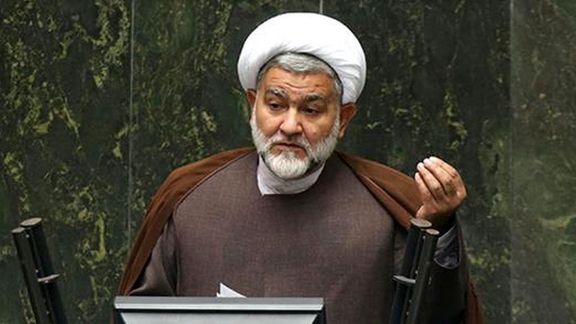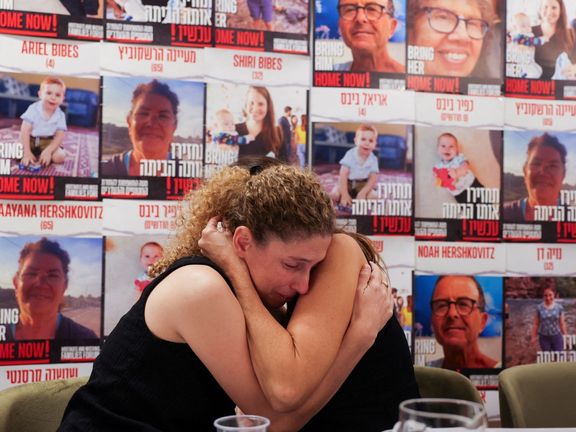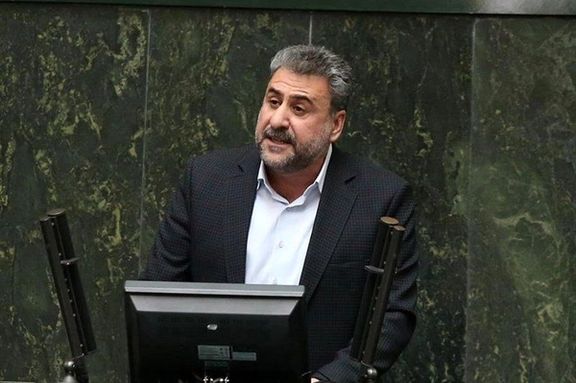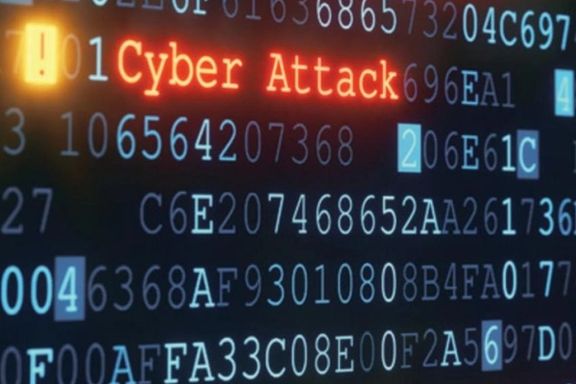Iranian Lawmaker Says Tehran Might Close Hormuz If US Intervenes

An hardline Iranian lawmaker has threatened that if the Hamas-Israel conflict worsens Tehran might enter the war and close the Strait of Hormuz in the Persian Gulf.

An hardline Iranian lawmaker has threatened that if the Hamas-Israel conflict worsens Tehran might enter the war and close the Strait of Hormuz in the Persian Gulf.
Media in Tehran reported that Hassan Norouzi, an influential lawmaker, was asked how Iran is planning to play a role in the war. He was quoted as responding that “So far, resistance forces in Palestine, Syria and Iraq are sufficient, but if the situation becomes critical and we are asked [for assistance], it is possible that we would go to war against Israel to support the resistance.”
Iran refers to Palestinian and other militant groups in the region that receive support from Tehran and act on its behalf, as the “Axis of resistance.”
Asked about what Iran would do if the United States entered the conflict, he replied, "The United States does not have the audacity to enter directly. If it does, it will face difficult conditions. Even if it attacks, the Middle East and Western Asia's resistance forces have the capability to counter. It's also not unlikely that we could close the Strait of Hormuz. If America directly aids Israel in a war, we will close the Strait of Hormuz."
Iran foreign Minister Hossein Amir-Abdollahian who was visiting Lebanon last week threatened a wider war if attacks continued against Hamas. "The continuation of war crimes against Palestine and Gaza will receive a response from the rest of the axis. And naturally, the Zionist entity and its supporters will be responsible for the consequences,” he stated.
The Iranian regime so far has celebrated Hams’ October 7 brutal attack on Israel that resulted in the killing of about 1,400 people, but has taken no direct military action to support Hamas.

A French-Iranian researcher, who recently returned to France after being held hostage in Iran, has expressed her deep appreciation for the Women, Life, Freedom movement.
Fariba Adelkhah said the movement, which sparked months of nationwide anti-regime protests, brought her “great joy during her time in the Iranian jail.”
Adelkhah made the statement during a visit to her workplace, the Paris Institute of Political Studies on Friday. Her return was met with warm welcome and encouragement from professors and students alike.
The renowned institute, often referred to as Sciences Po, announced on Wednesday that Adelkhah, who endured more than three and a half years of imprisonment in Iran, had returned to France.
Reflecting on the nationwide protests that erupted in Iran after the tragic death of Mahsa Amini, Adelkhah remarked, "We were very happy about what was happening outside."
The seasoned researcher praised the new generation in Iran, emphasizing that they have "nothing to lose" and are "much braver" than their predecessors.
Adelkhah was detained during her visit to Iran in June 2019 and subsequently sentenced to five years in prison, accused of espionage. She was released from Evin Prison in February and was recently allowed to leave the country.
She also disclosed that she spent "entire nights" writing during her imprisonment and interrogations to communicate to her captors that she was not the "spy" they perceived her to be.
Over the past decade, Iran's Revolutionary Guard has detained numerous dual nationals and foreign individuals, often on unsubstantiated allegations of espionage and security breaches. Human rights organizations have characterized the detentions as hostage-taking maneuvers designed to extract concessions from Western governments.

Iran’s ambassador to Thailand says some of the hostages taken captive by the Hamas after their attack on Israel will be set free when the IDF ceases bombardment of Gaza.
According to the Bangkok Post, Reza Nobakhti, speaking at a press conference held in Bangkok, discussed the hostages who hold Thai citizenship. He mentioned that he had been informed that Iran's President Ebrahim Raisi, who met with Ismail Haniyeh, the political leader of Hamas in Qatar last week, requested the release of the hostages as well as Filipino captives.
Among the approximately 200 hostages that Hamas has brought from Israel to Gaza, there are citizens from various countries, including 19 Thai nationals and individuals from the Philippines.
Nobakhti stated that all Thai hostages are being kept "safely in good health" in Palestinian territories, and the "well-being of Thai hostages is the main concern of Iranian authorities."
As of now, at least 30 Thais have been killed since the start of the war between Hamas and Israel.
He added that Hamas has agreed to release the hostages; however, “the challenge is that, due to Israel's continuous bombardment, they are unable to transfer the hostages from Gaza to Israel.”
On Friday Hamas announced the release of two American hostages, a mother and her daughter, following Qatar's mediation.
Bloomberg also reported that the United States and some European countries have called on Israel to postpone the ground offensive in the Gaza Strip, considering the ongoing negotiations for the release of hostages via Qatar.
Israel, in response, stated that the release of two American hostages by Hamas will not affect the country's ongoing military operations.

A prominent Iranian politician has called for the establishment of a tribunal to bring to trial the statesmen who have jeopardized Iran's national interests.
The former head of the Iranian parliament's National Security and Foreign Relations Committee Heshmatollah Falahatpisheh has told the press in Iran that three groups of Iranian statesmen should be put on trial on charges of weakening the country by their injudicious actions and policies.
He identified the three groups as "Those who have sacrificed national interests for factional political gains, those who have benefitted from international sanctions and plundered the country's financial resources, and those who prevented the forming of a rational foreign policy."
These characteristics point to ultraconservatives who have opposed cordial relations with the West and the JCPOA nuclear agreement between Iran and the United States. The same faction of hardliners also opposed accession to financial regulations set by the international Financial Action Task Force (FATF) that could have facilitated international trade and banking, as well as compromise with the European and American partners to the JCPOA that could have paved the way for ending the sanctions that have paralyzed Iran's economy.
Meanwhile, Falahatpisheh charged that the same ultraconservative groups, who previously claimed that furthering the negotiations to revive the 2015 nuclear deal was treason against the country's national interests and prevented the passing of the FATF bills, are currently pretending to be supporting the JCPOA and the ratification of financial regulations.

He was alluding to President Ebrahim Raisi and his ultraconservative economic teas and populist supporters in the government who have asked Supreme Leader Ali Khamenei to revive the debates about the FATF bills at Iran's Expediency Council, where the bills have been shelved since 2017 because of faction fighting at the parliament and government.
Falahatpisheh said that these groups, which he did not specifically identify, have squandered billions of dollars of the country's financial resources through their obstructive measures.
In another development, the conservative Jomhouri Eslami daily, a critic of the government policies wrote on Thursday that while it's a positive step that some of the country's officials have come to realize that their policies concerning the JCPOA and FATF were mistaken, these politicians should be held accountable for their decisions and compelled to bear the consequences of their detrimental actions.
The daily stated: "The people certainly welcome this change of approach on the part of the politicians who used to oppose the nuclear deal and healthy international trade and banking. But those politicians should be held accountable for the losses they imposed on the country's economy."
Similar to Falahatpisheh, Jomhouri Eslami also pointed out that some of the current advocates of the JCPOA and FATF are the same individuals who used to dismiss the nuclear agreement and FATF. "They asserted that they could address the country's economic problems without becoming party to the FATF conventions. They also contended that joining the convention would result in divulging Iran's economic secrets to foreigners and compromising the country's sovereignty."
The daily noted that during parliamentary discussions about the FATF, some individuals did not have a clear understanding of the acronym's meaning, and others even misspelled it.
Jomhouri Eslami also warned that although some hardliners now say they have changed their minds about the two topics, there is still a powerful opposition. The daily further warned that the continuation of this dispute might create bigger problems for Iran.
In yet another development, former President Hassan Rouhani told the congress of his political party, the Moderation and Development Party on Wednesday, that "Iran's way out of its current problems is moderation." Referring to the monopoly of power by hardliners, he warned that when a minority rules in the country, the people will have to voice their demands in the streets."

Iranian football (soccer) fans on Friday defied a government decision to observe a minute of silence for Gazans during a match in Tehran, by blowing horns and shouting.
The video of the protest quickly circulated on social media, as yet another manifestation of the public mood in Iran opposing the government’s ideological and material support for the Palestinian militant group Hamas.
The video captures the moment when spectators at the start of the game, reacted to the announcement for a minute of silence for Gaza with noise and the blaring of horns. The show of opposition occurred less than a week after a similar incident at a match involving Persepolis FC, where fans of that team chanted slogans against individuals displaying Palestinian flags in the stadium.
Remarkably, the video even prompted reactions from official Israeli social media accounts and authorities. Iran's leadership announced its full support for Hamas, an Iran-backed militant group responsible for a brutal attack on Israel and the massacre of around 1,400 people on October 7. Nearly 200 people, including women and children have also been taken hostage by the militants.
While the Iranian regime's propaganda apparatus organized street protests in support of Hamas in Tehran and other cities, reports from Iran suggest that the majority of participants were regime supporters and members of the Revolutionary Guard (IRGC) and their families. Ordinary Iranians largely refrained from participating in these rallies, emphasizing the complex and multifaceted nature of public sentiment within Iran.

A hacking group with ties to Iran, known as the Crambus espionage group, executed an extensive intrusion into the computer systems of a Middle Eastern government.
The espionage group’s intrusion spanned an eight-month period from February to September 2023.
The cyber attackers employed a range of tactics during the operation, including the theft of sensitive files and passwords, Symantec revealed.
The perpetrators introduced a PowerShell backdoor called PowerExchange in one instance, providing them with the ability to not only monitor but also execute commands through email messages, surreptitiously forwarded from an Exchange Server. The campaign impacted a minimum of 12 computers, with strong indications pointing toward the deployment of backdoors and keyloggers on numerous other systems.
Evidence has also emerged suggesting that the attackers went as far as modifying Windows firewall rules to enable remote access, demonstrating their resourcefulness.
The Crambus espionage group has long been associated with espionage operations in multiple countries, including Saudi Arabia, Israel, the United Arab Emirates, Iraq, Jordan, Lebanon, Kuwait, Qatar, Albania, the United States, and Turkey.
The group is recognized for its prolonged intrusions, primarily focused on intelligence gathering and espionage. In recent times, they have incorporated a substantial social engineering component into the initial stages of their cyber-attacks.
The activities of the group over the past two years indicate that they pose a continuous threat to the Middle East and beyond.
The United States government had previously attributed the group to the Ministry of Intelligence of the Islamic Republic.